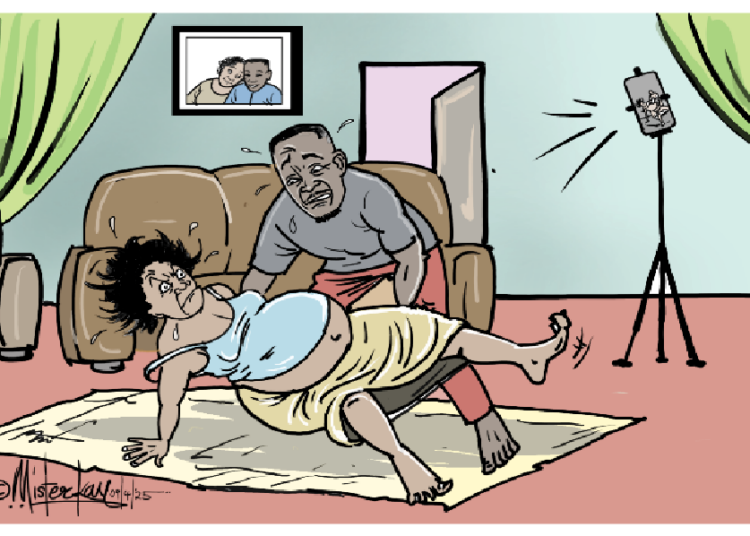They say childbirth is the beginning of life. But for one pregnant Nigerian woman, it marked the end—she died in agony and desperate need for medical attention while her husband live-streamed the entire ordeal online. There was no emergency intervention. No ambulance. No midwife or skilled birth attendant in sight. Just a phone, a camera, and a crowd of online spectators watching another Nigerian woman die.
In February 2025 in the Lekki/Ibeju area of Lagos State, Kemi Akinbobola’s tragic death was a devastating reflection of the intersection between Nigeria’s broken health system, the disempowerment of women, and a digital culture that turns human suffering into entertainment. It is also a call to action—to address the deep gaps in our healthcare system and the urgent need for comprehensive health insurance and gender-responsive health policies that empower women to take control of their bodies and lives.
Kemi, according to online reports had been in labour for hours and was not registered for antenatal care. Her husband Folajimi took her to a private hospital where she was allegedly refused care because they could not pay the deposit. Unfortunately, she died on the way to the public hospital they had been referred to. They had nine months to plan for this day, but she died due to ignorance, negligence, and poor health infrastructure.
She died, not only from labour complications but from systemic failure. Not in a hospital. Not surrounded by trained professionals but on a smartphone screen, on social media, where her husband live-streamed her labour as she struggled, pleaded, and eventually died. Not from a rare disease or complicated diagnosis, but from something tragically common in Nigeria: the absence of timely, affordable, quality care.
A Maternal Health Crisis
Nigeria remains one of the most dangerous places in the world to give birth and ranks among the countries with the highest maternal mortality rates at over 20% of the world’s maternal deaths. According to data from the National Demographic and Health Survey (NDHS) and the World Bank, approximately 1,000 women die for every 100,000 live births—and in some rural areas, the figures are even more dire. Behind these numbers lie real people, real families, and stories like this one—where the lack of access to quality maternal healthcare becomes a death sentence.
Let’s call it what it is, she was failed by a country that has not prioritized maternal health. Failed by a system where access to care is not universal, where women often need permission or money to see a doctor, and where silence and shame too often surround reproductive health.
The contributing factors are clear: limited access to primary healthcare facilities, cultural practices that prevent women from making health decisions independently, and, critically, inability to afford care when complications arise. Many families avoid hospitals not because they want to, but because the costs are simply out of reach. When over 90% of health expenditures are out-of-pocket, a visit to the hospital can be financially catastrophic.
This is where universal, affordable and gender-sensitive health insurance must come in—not as a privilege for the few, but as a national priority for all. Imagine if Kemi had access to a health insurance plan that guaranteed emergency obstetric care. Imagine if her husband knew that help was just a call away, without the fear of an unaffordable hospital bill. That livestream could have been a birth announcement, not a death chronicle.
Comprehensive Health Insurance
Nigeria has made strides with the National Health Insurance Authority (NHIA) Act, which now mandates health coverage for all. However, implementation remains slow, especially at the grassroots level. Awareness is low. Enrolment is uneven. Many women—especially in rural communities—are unaware of their entitlements under the scheme. Others are excluded entirely due to poverty, lack of documentation, or bureaucratic delays.
What we need is a robust, accessible, and accountable health insurance system that centres the needs of women, particularly during pregnancy, childbirth, and postpartum care. This includes free antenatal and postnatal care for all women, coverage for emergency obstetric services and caesarean sections, community-based education about health rights and entitlements, and policies that remove financial and logistical barriers to enrolment
The government must expand and fully implement the NHIA, ensuring maternal health is central to all packages, educate communities, especially men, about the importance of women’s health and rights, fund women-led health advocacy groups that work at the grassroots to bridge the gap between policy and practice, hold digital platforms accountable for enabling the exploitation of vulnerable people online and create emergency response systems that can be accessed even in rural or informal settings.
Too often, women are excluded from decision-making about their own health. In many homes, they must seek permission to go to the clinic, take medication, or even rest during pregnancy. Many are taught to endure rather than speak up, to submit rather than resist.
Community-based solutions are essential. Women’s groups, midwives, traditional birth attendants, and grassroots health workers must be supported and integrated into the formal health system. Local leaders—religious, traditional and political—must be engaged to challenge the norms that perpetuate women’s disempowerment.
One of the most urgent lessons from this tragedy is the critical need for comprehensive, accessible health insurance. Women should not be forced to choose between enduring pain at home or facing bills they cannot afford at the hospital.
Health insurance should not be a privilege. It should be a lifeline. A pregnant woman should never hesitate to go to the hospital because she’s worried about costs. She should not be dependent on a husband or relative who may delay, deny, or refuse her the care she needs.
Beyond Insurance: Voice, Power and Agency.
Health insurance alone is not enough. The deeper problem is the systemic disempowerment of Nigerian women when it comes to health decisions. Too many women still need permission from their husbands or family elders to seek medical attention. Too many are conditioned to endure pain quietly. Too many are afraid to speak up—even when their lives are at risk.
We must reframe maternal health not as a charity issue but as a human rights issue. Nigerian women must be given the tools to exercise voice, power, and agency over their health. This means comprehensive reproductive and maternal health education in schools, communities, and through media and enforcement of women’s rights to health, safety, and bodily autonomy.
It also means supporting women to be financially independent and able to access care without relying solely on spouses and a cultural transformation that involves engaging men, religious leaders, and traditional rulers in shifting harmful norms and promoting shared decision-making in families.
We need to ask ourselves hard questions about how we value women’s lives, especially when they are poor, pregnant, and powerless. Our digital spaces must be held accountable, and we must build ethical norms around the use of technology in intimate or traumatic situations.
What happened to Kemi Akinbobola is not just a personal or family tragedy. It is a collective and systemic indictment. It exposes the brutal cost of our broken healthcare system, the dangerous power imbalances that still define many women’s lives, and the yawning gap between Nigeria’s health policies and the realities in homes across the country.





